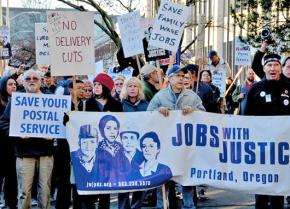Don’t starve the post office
A group of unionists and activists are taking action against cuts at the USPS.
THE FEDERAL government is starving the U.S. Postal Service (USPS) of resources, so activists are organizing a hunger strike of their own in protest.
The action is planned to begin in Washington, D.C., on June 25, the last week before the USPS begins downgrading its service. On July 1, it's scheduled to discontinue overnight single-piece first class mail delivery, part of a broad attack that will affect tens of thousands of postal workers and the customers who depend on them.
In mid-May, Postmaster General Patrick Donahoe announced that half of the mail sorting plants in the country would be closed, and half the nation's post offices would have their hours cut by anywhere from 25 to 75 percent.
The eight hunger strikers want the postmaster general to agree to stop cuts and closures while Congress looks into a funding mandate that is at the heart of the USPS's financial troubles.
"Not the internet, not private competition, not the recession--Congress is responsible for the postal debt," said Jamie Partridge, a retired letter carrier traveling from Portland, Ore., for the hunger strike. "Corporate interests, working through their friends in Congress, want to undermine the USPS, bust the unions, then privatize it."

In 2006, Congress passed a mandate requiring that the USPS prefund retiree health benefits 75 years in advance. Without this mandate, hunger strikers argue, postal revenues came close to matching expenses over the past six years. They also say that the USPS has overpaid tens of billions into two pension funds. But the postmaster general would prefer to cut jobs and services.
The proposed destruction of good-paying postal jobs is one aspect of a larger assault on public-sector unions. And these cuts would hit African American workers the hardest. The Postal Service employs the largest number of Black workers making over $50,000 a year of any employer. African Americans make up 21 percent of the postal workforce.
As a recent press release from the hunger strike organizers, Communities and Postal Workers United, points out:
The loss of government paychecks erodes one of the great equalizing forces at play in the American economy for more than a century. A government job has long offered a pathway for African Americans to sidestep discrimination that has impeded progress in the private sector, where social networks often determine who has a shot at the best jobs, say experts.
The hunger strike is scheduled to start on June 25 at 8 a.m. and end on June 28 at 6 p.m. Visit the Communities and Postal Workers United website for more information on hunger strike and solidarity events planned in other cities.


